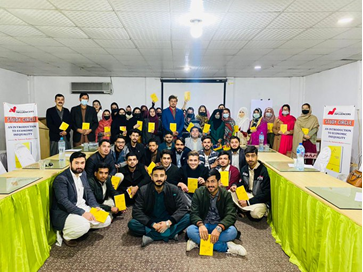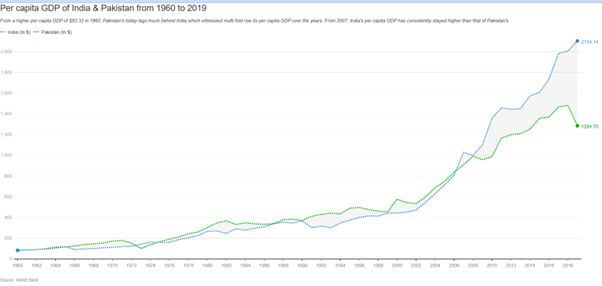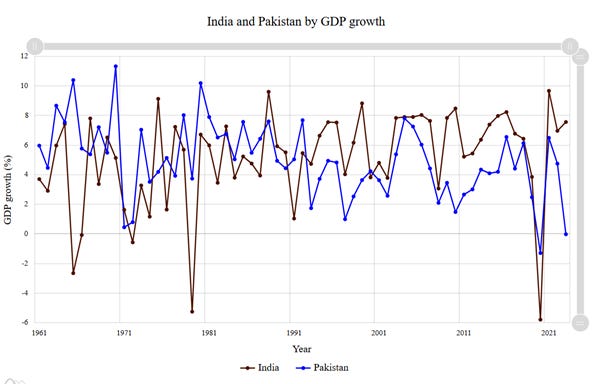A Path to Peace and Prosperity in Pakistan
IEA partners working to deepen understanding of trade, markets, and open societies in Pakistan
The Whetstone Freedom Fund (WFF) is an international initiative founded by the Institute of Economic Affairs in honour of the late Linda Whetstone, to support classical liberal ideas around the world. Each month on Insider we take a deep dive into the countries and partnerships which are being supported by the WFF.
Russia's ongoing invasion of Ukraine and the outbreak of live conflict between Israel and Iran have the world watching anxiously and helplessly amid the heightened global risk of nuclear war. Exchanges of fire between India and Pakistan in May further reminded us that direct engagement between nuclear-armed foes is a perpetual, lingering risk in the Asian subcontinent. Animosity between the two countries’ governments goes back to their creation, when the British Empire partitioned its south Asian colony into two states – the secular Hindu-majority India and the Muslim-majority Pakistan which went on to become an Islamic republic.
Since partition, central planning, weak rule of law, and byzantine tax and regulatory systems have undermined economic development and human flourishing in both countries. Over the past four decades, India has become one of the fastest growing economies in the world, far outstripping its northwestern neighbour. But for the first three decades post-partition, Pakistan’s economy was larger and grew faster.
Two of the IEA’s long-standing international partners are, however, working to deepen understanding of trade, markets, and open societies among Pakistani students. By doing this vital work, National Influencers and the Alternate Solutions Institute are establishing the foundations for a freer, more prosperous Pakistan in which the economic opportunities that come with open, dynamic markets are available to all.

Diverging Fortunes
While political tensions have endured, the countries’ economies have diverged dramatically. In the early years of independence, Pakistan outpaced India. India embraced Soviet-style five-year plans and nationalised key industries. Pakistan gave private investment a greater role, transitioning more quickly from an agrarian economy to one with growing manufacturing and service sectors. Combined with Western aid, this drove Pakistan’s growth to 5–6% in the 1950s and 1960s, compared to India’s 3–4%.
The trend continued under military ruler Ayub Khan, whose pro-market policies fuelled a “Decade of Development” with per capita GDP growth near 7%. Meanwhile, India expanded nationalisation, tariffs, quotas, and the ‘Licence Raj,’ leading to sluggish growth, low productivity, and high inflation by the 1970s.
But the 1970s marked a turning point. The loss of East Pakistan in 1971 reduced output and stability. Under Zulfikar Ali Bhutto, large-scale nationalisation scared away investors and slowed growth to levels closer to India’s.
By the late 1970s, India’s economic model was also faltering. Sluggish growth, weak output, and the rise of the Asian Tigers amplified calls for reform. Under Rajiv Gandhi, India began liberalising through modest deregulation, reduced import controls, and partial privatisations. A fiscal crisis in 1991 accelerated reform. India dismantled the ‘Licence Raj,’ removed import restrictions, cut tariffs, liberalised capital markets, and began privatising state monopolies. These reforms drove annual growth rates to 6–7%, putting it on the path to becoming an emerging economic power.
Pakistan, meanwhile, faced increasing instability. Political turmoil and weak institutions eroded investor confidence. Reform efforts repeatedly stalled, and corruption took its toll. Growth fell from 5–6% in the 1980s to around 3% in the 1990s, prompting repeated IMF bailouts.
Since 2000, the divergence has continued. India has further liberalised, simplified its tax system, and strengthened institutions. Despite a brief uptick under the brutal military dictatorship of Pervez Musharraf, Pakistan’s 21st-century history has been defined by recurring crises. Today, India’s GDP per capita is nearing $3,000 and growing at 6–7% per year. Pakistan’s remains around $1,500, with growth barely exceeding 2%.
Seeds of Hope
Despite Pakistan’s recent economic woes, there are people who are advancing the free market cause. National Influencers (NI) is a think tank based in the northwestern Khyber Pakhtunkhwa province who aim to expand freedom and prosperity in Pakistan through research and outreach to students, academics, and journalists.
NI’s research output addresses urgent policy issues in Pakistan like regulatory and institutional reforms, while their student programmes seek to teach the next generation of academics, policy experts, and civil servants to understand the value of free markets.
As part of their work to disseminate the fundamental principles of a free society throughout Pakistan, NI have translated four of the IEA’s primers into Urdu for use in their student programmes, which reach more than one thousand people each year. Having worked with Linda Whetstone and her Network for a Free Society since 2020, NI’s most recent project with the Whetstone Freedom Fund reached over 900 students with the ideas in Eamonn Butler’s An Introduction to Trade and Globalisation.
Through 20 events and broad social media outreach, over 1,000 translated copies were distributed across the Urdu-speaking world.

In addition, NI has sought to test students’ engagement with the ideas by holding small group seminars and reading groups. Historically, Pakistan was far more open and attractive to international trade and foreign investment. By engaging the next generation of thinkers with the transformative potential of free trade, it can be again.
In the northeast of Pakistan, the Alternate Solutions Institute (ASI) has been working to deepen young people’s understanding of free market principles for over two decades. According to ASI’s Honorary President Dr Raza Ullah, Linda Whetstone helped to shape its direction through strategic guidance and unwavering support, playing a vital role in helping to advance the institute’s mission.
“Linda’s mentorship was present in almost every project we undertook; her advice and moral support were constant sources of strength and direction”, Dr Ullah wrote to me in early June.
ASI’s annual Khanaspur Residential Courses convene groups of 30-40 top applicants who show outstanding interest in free market ideas. Over the course of a week, students engage with a series of seminars, discussions, lectures, and workshops based on key principles of a free society. ASI has made extensive use of the Urdu translation of Eamonn Butler’s Foundations of a Free Society as a vital resource which succinctly outlines the essential building blocks of freedom and prosperity.
The course also uses prominent international indexes like the Fraser Institute’s Economic Freedom of the World Report and the Property Rights Alliance’s International Property Rights Index, to teach attendees about the specific policy changes required to make Pakistan’s economy freer.
ASI alumni now work in media, government, and policy, advancing free market ideas. One is Muhammad Sulaiman who went on to found National Influencers; another is Dr Ali Salman who founded Policy Research Institute of Market Economy (PRIME), an influential policy think tank based in the Pakistani capital Islamabad. ASI alumni can be found across government departments as both civil servants and advisors.
Dr Ullah expressed hope that free market reform in Pakistan held the key to not only unleashing prosperity within the country but also to reconciliation with India. He wrote to me:
“The hostility between the two countries reflects, in many ways, the principles of a closed society. As Frédéric Bastiat once observed, ‘when goods do not cross borders, soldiers will’. The lack of formal trade relations between India and Pakistan has only served to deepen divisions and prolong enmity. Encouraging trade and economic interdependence remains one of the most promising paths toward lasting peace.”
Both National Influencers and the Alternate Solutions Institute are doing vital work to keep free market ideas alive in Pakistan and sow the seeds of future prosperity. Long may it continue!
How You Can Help
With the WFF's support our partners are spreading the foundational ideas of a free society right across the globe. In Burundi and beyond, the WFF continues Linda Whetstone's legacy of supporting organisations to defend and expand liberty in the places that need it the most. None of this work would be possible without your support. If you would like to support the Whetstone Freedom Fund or find out more about the work we do, visit our website.






